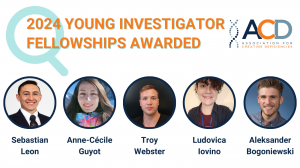ACD Funds $135,000 in Creatine Deficiency Research Fellowship Awards
Association for Creatine Deficiencies announced the funding of $135,000 for 5 early career researchers studying Cerebral Creatine Deficiency Syndromes.
The researchers whose projects were funded include:
Sebastian Leon received the award to pursue research to establish that creatine-loaded nanoparticles can pass the blood-brain barrier. Leon is working under the mentorship of Dr. Swadesh Santra at the University of Central Florida.
Troy Webster will conduct preclinical dose-finding studies on a gene therapy for Creatine Transporter Deficiency (CTD). Webster is supported by mentor Dr. Jagdeep Walia at Queen’s University in Kingston, Ontario, Canada, who is overseeing an ongoing CTD gene therapy project which Webster’s fellowship project will support.
Anne-Cécile Guyot is pursuing an organoid project under mentor Dr. Aloise Mabondzo at CEA/Paris Saclay University in Paris. This project will focus on using human brain organoids from CTD patients to see if a correction can be triggered in target proteins in response to pharmacological interventions.
Ludovica Iovino, Ph.D., will further efforts on gene therapy investigation for CTD in the lab of Dr. Laura Baroncelli at the Institute of Neuroscience in collaboration with Fondazione IRCCS Stella Maris, both in Pisa, Italy.
Aleksander Bogoneiwski will characterize CTD and Guanidinoacetate Methyltransferase (GAMT) Deficiency patient cell-derived organoids to find effective gene therapies under the guidance of Dr. Gerry Lipshutz at UCLA.
“We are thrilled to support these innovative CCDS projects, as well as the hope for treatments and a cure that they bring to our community,” said ACD Executive Director Heidi Wallis. “These fellowships would not be possible without our generous donors and the passionate researchers that will collaborate with our 2024 fellows on these projects.”
The overarching goal of the ACD Fellowship program is to fund opportunities with a high potential for translational research success, leading to eventual treatments for creatine deficiency syndromes. The ACD fellowship program aims to support young researchers, early in their career, to focus on creatine deficiencies. Many previous fellowship recipients have continued in creatine deficiency research, expanded their projects and received funding from varied sources, including grants and university backing, to continue their CCDS research. An interim update of the progress made by the 2024 fellowships will be shared at the 2024 Scientific + Patient Symposium in June.
Grant applications were evaluated to ensure there are novel ideas being brought to creatine deficiency research or expansion on a previously explored, promising pathway to a deeper understanding of CCDS, as well as potential for making steps towards clinical trials for CCDS patients.
“The excitement and commitment from the 2024 research fellows and their mentors reflects the growth and promise in the field of CCDS research,” said ACD Scientific Advisor Dr. Sangeetha Iyer. “We are thrilled that this was our most sought after series of fellowship grants, as well as our largest number of grants awarded in a year, and we are inspired by the continued dedication of all researchers who focus on creatine deficiency research.”
Applications for 2025 fellowship grants will be accepted in the fall of 2024. Visit the ACD website to learn more about CCDS research funding opportunities.
About ACD: The Association for Creatine Deficiencies’ mission is to eliminate the challenges of CCDS. ACD is committed to providing patient, family, and public education to advocate for early intervention through newborn screening, and to promote and fund medical research for treatments and cures for Cerebral Creatine Deficiency Syndromes. Because CCDS mimic symptoms of other medical conditions, patients are often first diagnosed with autism, cerebral palsy, epilepsy, and other disorders. Proper diagnosis and early intervention are critical to establishing interventions needed to improve life quality and longevity for the CCDS patient. For more information regarding ACD, please visit creatineinfo.org.
# # #
Erin Coller
Association for Creatine Deficiencies
+1(801) 893-0543
email us here
Visit us on social media:
Facebook
Twitter
LinkedIn
Instagram
YouTube
TikTok
Legal Disclaimer:
EIN Presswire provides this news content "as is" without warranty of any kind. We do not accept any responsibility or liability for the accuracy, content, images, videos, licenses, completeness, legality, or reliability of the information contained in this article. If you have any complaints or copyright issues related to this article, kindly contact the author above.

